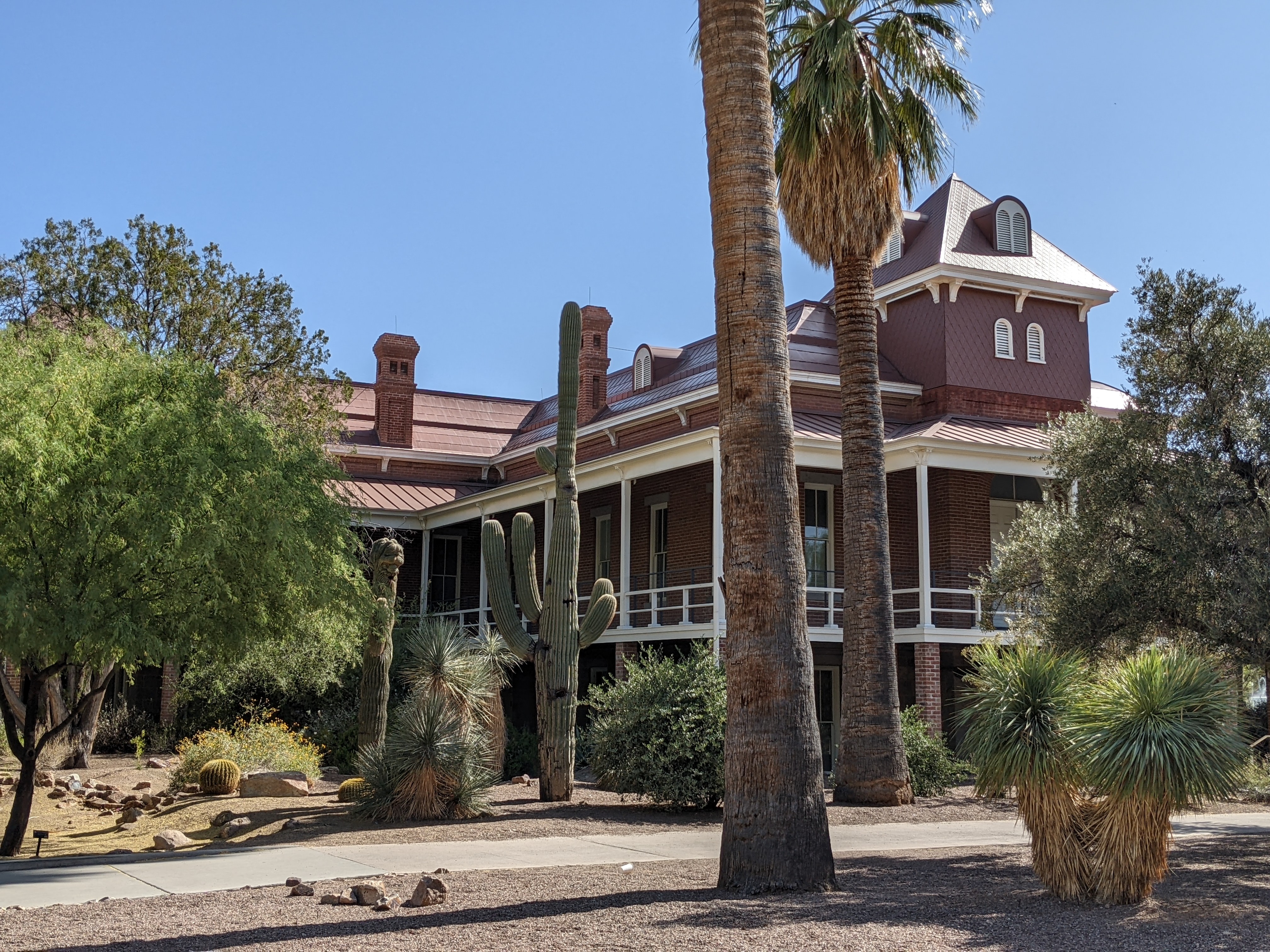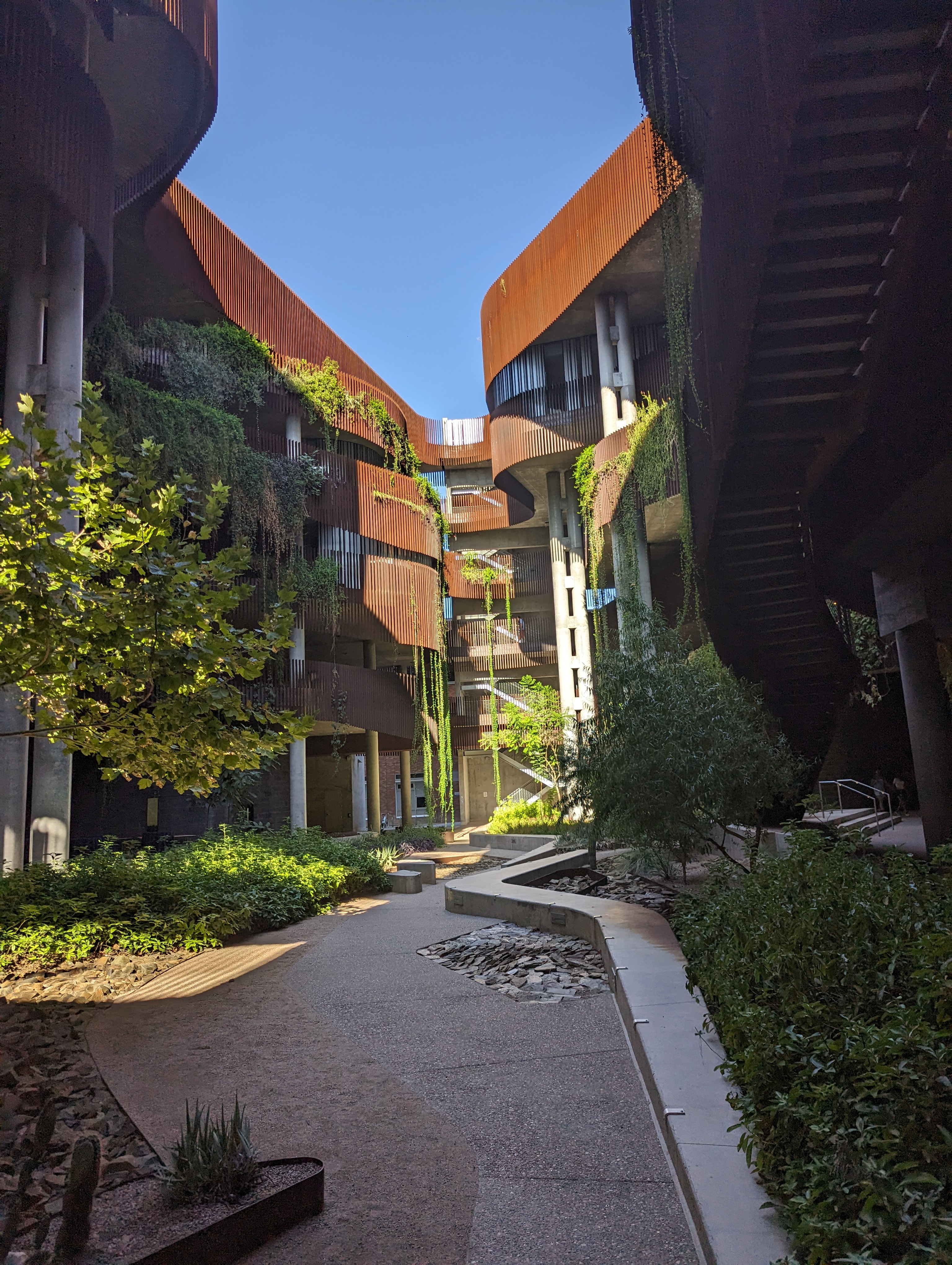Welcome
After Victoria 2018 , Budapest 2019 , EAS 2021 , and Jena 2022 , we are delighted to host the fifth edition of the "Current and Future Trends in Debris Disc Science" meetings series in the Grand Canyon state!

SOC:
Steve Ertel (chair, Steward Observatory)
Christine Chen (STSci)
Tom Esposito (UC Berkeley)
Meredith Hughes (Wesleyan)
Luca Matrà (Trinity College)
Tim Pearce (Friedrich Schiller Universität)
Kate Su (Steward Observatory)
Alycia Weinberger (Carnegie)
Siyi Xu (Gemini Observatory)
LOC:
Virginie Faramaz-Gorka (chair)
Cathi Duncan
András Gáspár
Hélène Rousseau
Schuyler Wolff
We, at University of Arizona, are committed to creating a work environment that is safe, professional and of mutual trust where diversity and inclusion are valued, and where everyone is entitled to be treated with courtesy and respect. UofA organisers commit to making conferences, workshops, and all associated activities productive and enjoyable for everyone. We will not tolerate harassment of participants in any form.
Please follow these guidelines:
1. Behave professionally. Harassment and sexist, racist, or exclusionary comments or jokes are not appropriate. Harassment includes sustained disruption of talks or other events, inappropriate physical contact, sexual attention or innuendo, deliberate intimidation, stalking, and photography or recording of an individual without consent. It also includes offensive comments related to individual characteristics, for example: age, gender, sexual orientation, disability, physical appearance, race, nationality or religion.
2. All communication should be appropriate for a professional audience including people of many different backgrounds. Sexual or sexist language and imagery is not appropriate.
3. Be respectful and do not insult or put down other attendees or facilitators of the event. Critique ideas not people.
4. Should a participant witness events of bullying, harassment or aggression, we recommend that they approach the affected person to show support and check how they are. The witness may also wish to suggest that the person report the inappropriate behaviour. However, it is up to the affected person alone whether or not they wish to report it.
5. If participants wish to share photos of a speaker on social media, we strongly recommend that they first get the speaker’s permission. Participants may also share the contents of talks/slides via social media unless speakers have asked that specific details/slides not be shared.
The members of the Local Organizing Committee (red badges) are designated as the contact points for all matters related to this code. Participants can report any violation of these guidelines to these designates in confidence. If asked to stop inappropriate behavior participants are expected to comply immediately and, in serious cases, may be asked to leave the event without a refund. We will not tolerate retaliation against anyone reporting violations of this code of conduct.
We inform the participants that this workshop is in compliance with NASA Policy Statement on Anti-discrimination in NASA Conducted or Funded Program, Activities, and Institutions. As such, any participant targeted by inappropriate behavior is entitled to file a complaint to the relevant entities (Uof A Title IX office, NASA). The chair of the LOC (Virginie Faramaz) will be responsible for assisting them in the process.
Thank you for helping to make this workshop welcoming for all.
We respectfully acknowledge the University of Arizona is on the land and territories of Indigenous peoples. Today, Arizona is home to 22 federally recognized tribes, with Tucson being home to the O’odham and the Yaqui. Committed to diversity and inclusion, the University strives to build sustainable relationships with sovereign Native Nations and Indigenous communities through education offerings, partnerships, and community service.
Registration

We are excited to announce that the registration is now available, and will remain open until November 30th 2023 for in-person attendance (or until we have reached the 120 people cap). We are happy to announce that we have secured funding from NASA and NAASC, and will make this meeting free of registration fee.
In compliance with the funding agreements, we have to ask everyone attending in-person to present their work (at least a poster).
Do not worry if this is work in progress! We want to know about you and what you are working on. This workshop is meant to be a friendly setting where you actually have the opportunity to discuss work in progress and get inputs from the community.
The funds we have secured will also allow us to award travel support to people who otherwise don't have funds available to attend. We wish to support early career researchers and our colleagues from low-income countries and low-budget institutions. We will do our best to support as many people as we can, and will support in priority the participants who will be selected to give a talk and students.
If the 120 people cap has not been reached, late registration for in-person attendance will be open until December 31st 2023, however, you will not be able to apply for travel funding anymore.
Registration for remote participation will remain open until the meeting starts, though it shall be noted that you will be limited to viewing the talks and interacting with the other participants through the Slack channel.
Please fill out the registration form, and let us know as well of any dietary restriction and accommodation you'd need, as well as your favorite pronouns. Finally, if you register to this workshop, note that you implicitly agree to abide by our code of conduct, which you can read below.
REGISTRATION FORM & ABSTRACT SUBMISSION
Program
Our program is available HERE and the detailed abstracts are available THERE
Here is the list of topics that have been selected for this workshop, as well as the wonderful invited review speakers for each. Click on their names to read the abstract for their talks.
Registered Participants
Ramya Anche (Steward Observatory)
Simon Anghel (Astronomical Institute of the Romanian Academy)
Jean-Charles Augereau (IPAG - Univ. Grenoble Alpes)
Arin Avsar (University of Arizona)
Oier Baraibar Larraza Instituto de Astrofísica de Andalucía (IAA-CSIC)
Grace Batalla Falcon (Universidad Diego Portales)
Paula Benavidez Lozano (Universidad de Alicante)
Raphaël Bendahan-West (University of Exeter)
Camille Bergez-Casalou (LESIA/Paris Observatory)
Bryce Bolin (Goddard Space Flight Center)
Mark Booth (UK ATC)
Sandipan Borthakur (University of Tartu)
Luke Bouma (Caltech)
Aoife Brennan (Trinity College Dublin)
Alessandro Bressani (University of Arizona)
Geoffrey Bryden (JPL - Caltech)
Holly L. Capello (University of Berne)
Areli Castrejon (University of Groningen)
Yiwei Chai (Johns Hopkins University)
Kenny Chan (Univ of Southern Queensland / Montana State University)
Christine Chen (STScI)
Jay S. Chittidi (University of Colorado)
Gabriella Contardo (SISSA)
Daniel Cotton (Monterey Institute for Research in Astronomy)
William C. Danchi (NASA Goddard Space Flight Center)
Neeraj Dapurkar (Ludwig Maximilian University of Munich)
Rogerio Deienno (Southwest Research Institute)
John Debes (STScI)
Ewan Douglas (University of Arizona)
Natalia Engler (ETH Zürich)
Steve Ertel (Steward Observatory)
Tom Esposito (UC Berkeley - SETI Institute)
Virginie Faramaz-Gorka (Steward Observatory)
Jay Farihi (University College London)
Marc Friebe (University of Jena)
Eric Gaidos (University of Hawaii at Manoa)
Germain Garreau (KU Leuven)
András Gáspár (Steward Observatory)
Gergely Hajdu (Nicolaus Copernicus Astronomical Center)
Antonio Hales (NRAO)
Yinuo Han (University of Cambridge)
Arcelia Hermosillo Ruiz (UC Santa Cruz)
Justin Hom (Steward Observatory)
Charles Horton
Ying-Chi Hu (National Tsing-Hua University/ASIAA)
Paul Huet (LESIA/Paris Observatory)
Meredith Hughes (Wesleyan University)
Daniela Iglesias (University of Leeds)
Carl Ingebretsen (Johns Hopkins University)
Javed Iqbal (Institute of Space Technology Islamabad)
Haochang Jiang (ESO - Tsinghua University)
Jesse Jose (IISER Tirupati)
Deniz Kacan (Purdue University)
Paul Kalas (UC Berkeley)
Tom Kaye (Raemor Vista Observatory)
Grant Kennedy (University of Warwick)
Minjae G. Kim (University of Warwick)
Hiroshi Kobayashi (Nagoya University)
Quentin Kral (Paris Observatory)
Sai Krishanth Pulikesi Mannan (University of Arizona)
Jay Kueny (University of Arizona)
Antoine Lacquement (IPAG- Univ. Grenoble Alpes)
Kellen Lawson (NASA Goddard Space Flight Center)
Érika Le Bourdais (Université de Montréal & Trottier Institute for Research on Exoplanets)
Briley Lewis (UCLA)
Yu-Chia Lin (University of Arizona)
Carey Lisse (John Hopkins University)
Qiong Liu (Guizhou University)
Torsten Löhne (University Jena)
Feng Long (University of Arizona)
Ronald A. Lopez (University of California, Santa Barbara)
Joshua B. Lovell (Harvard-Smithsonian Center for Astrophysics)
Cicero Lu (NSF's NOIRLab, Gemini North Observatory)
Patricia Luppe (Trinity College)
Jie Ma (IPAG)
Sorcha Mac Manamon (Trinity College)
Renu Malhotra (University of Arizona)
Franco Mallia (Campo Catino Observatory)
Sebastian Marino (University of Exeter)
Jonty Marshall (ASIAA)
Gregory Mathews Ben (Indian Institute of Science Education and Research Tirupati)
Luca Matrà (Trinity College)
Brenda Matthews (NRC Canada)
James Miley (Universidad de Santiago de Chile)
Julien Milli (IPAG, France)
Joan Najita (NOIRLab)
Riouhei Nakatani (JPL-Caltech)
Azib Norazman (University of Warwick)
Ayaka Okuya (National Astronomical Observatory of Japan)
Kevin Ollmann (Christian-Albrechts-Universität zu Kiel)
Tim Pearce (University of Warwick)
Arthur Péronne (ETH Zürich)
Pedro Poblete Rivera (UGA)
Andrew Poppe Rivera (Space Sciences Lab, UC Berkeley)
Philippe Priolet (IPAG, - Univ. Grenoble Alpes)
George Rieke (Steward Observatory, University of Arizona)
Isabel Rebollido (ESA)
Akshay Robert (University College London)
Laura Rogers (University of Cambridge)
Hélène Rousseau (Steward Observatory & Liège University)
Hans M. Schmidt (ETH Zürich)
Antranik A. Sefilian (University of Jena)
Kevin D. Smith (Trinity College)
Max Sommer (University of Cambridge)
Karl Stapelfeldt (JPL - Caltech)
Sophia Stasevic (LESIA/Paris Observatory)
Jordan Steckloff (Planetary Science Institute)
Amy Steele (Yerkes Observatory)
Robert Stencel (Universities of Michigan and Denver)
Thomas Stuber (University of Arizona)
Kate Su (Steward Observatory, University of Arizona)
Andrew Swan (University of Warwick)
Karolina Szewczyk (University of Leeds)
Anas Salman Taha (University of Baghdad)
Berhe Tewelde Teklhaimanot (University of Vale do Paraiba)
Philippe Thébault (Paris Observatory)
Simin Tong (University of Leicester)
Vasuda Trehan (University at Albany, SUNY)
Isabella Trierweiler (UCLA)
David Trilling (Northern Arizona University)
Anastasios Tzanidakis (University of Washington)
Zach Vanderbosch (Caltech)
Kevin Wagner (University of Arizona)
David Wilner (Center for Astrophysics - Harvard & Smithsonian)
Sebastian Wolf (Kiel University)
Schuyler Wolff (Steward Observatory)
Kadin Worthen (Johns Hopkins University )
Yanqin Wu (University of Toronto)
Mark Wyatt (IoA, Cambridge)
Chen Xie (John Hopkins University)
Siyi Xu (Gemini Observatory/NOIRLab)
Inbok Yea (University of Delaware)
Sherry Yeh (W. M. Keck Observatory)
Brianna Zawadzki (Wesleyan University)
Ben Zuckerman (UCLA)
Travel, Stay, Food, and more

TRAVEL to and moving around:
Tucson can be reached via its international airport (TUS) which is only a 20min drive from downtown. From there, you can either find car rental companies, take a taxi, or take public transportation.
Traveling from the airport to downtown using public transportation will take about an hour, however, note that PUBLIC TRANSPORTATION IN TUCSON IS FREE! That includes buses, tram, shuttles. There's even a "On demand" service that will pick you up and drop you where you need. More information on our public transportation system HERE.
There are many things to do around Tucson and visit. Whether you are staying just for the conference or extending your stay to get to see more of our beautiful Sonoran desert, whether you plan on staying close to Downtown or rent a car to explore more, you will find ideas of visits HERE , and you will find some Travel Safety Notes THERE!
STAY:
We have reserved blocks at the best possible rates at the two following hotels. Follow the link to make your reservations!
• Marriott University Park, 2nd and 1 st Ave. BLOCK RESERVATION LINK.
• Aloft Tucson University corner of Campbell and Speedway BLOCK RESERVATION LINK.
Another option close to campus is the Graduate Hotel, near 2nd Street and Park Ave, although we did not manage to get reservation blocks from them.
IDEAS OF ACTIVITIES TO DO IF YOU COME WITH YOUR KIDS:
And even if you don't! Many thanks to Andras Gaspar for assembling this list.
• Tucson Children's museum
• Desert Museum (Pack Rat Playhouse)
• Botanic Gardens
• Miniature Time Museum
• Reid Park Zoo
• Flandrau Planetarium and Science Center
• Defy Tucson; Golf N' Stuff
• Tohono Chul
• Skate Country
• Air & Space Museum
• Gaslight Theatre
• Biosphere 2
• Old Tucson Studios
• UA Poetry Center
• UA Catalyst Studios
VENUE:
The workshop will take place at the ENR2 building, which is on the University of Arizona campus. ENR stands for Environment and Natural Resources, and is a building which architecture is inspired by the numerous canyons our desert hosts.
Talks will take place in the S107 room, and additional rooms are reserved for coffee breaks and poster viewing.
An interactive campus map can be found HERE . In addition of displaying buildings, it will also display transportation (in particular, note that the campus has its own system of free shuttles, the CatTran), and places to eat (see also next paragraph)
Last but not least: FOOD!
Did you know: Tucson is the only city in the USA that is a UNESCO city of gastronomy! What does this mean? Tucson received this distinction because the food here tells a story that dates back 4,000 years. The city’s culinary heritage is a tapestry of Mexican and Native American traditions. Eating local means honoring history, and each bite is an experience. You will find a list of restaurants that are certified TCOG (Tucson City of Gastronomy) and who celebrate this heritage HERE.
More generally, you will find in Tucson many and a great variety of restaurants and eateries, for each taste, diet, and wallet, whether you stay close to Downtown or are willing to adventure a bit further out. More information HERE. , and do not forget that out organizing team and our local participants will be more than happy to share their favorite spots with you!
Finally, if you are looking for spots on campus to eat close to the venue, you can check the Student's Union Memorial Center, which features a huge food court and plenty of options for all tastes More information HERE.
Crash Course
Organizers: Hélène Rousseau & Virginie Faramaz
The goal of this crash course is 1) to familiarize yourself with the basic concepts of debris disks, 2) to get to know early career people and build a community, and 3) to hear about the career developments that are possible in this field.
Our program is available here HERE.
This crash course will include two dedicated Hands-on session, one on general circumstellar disk emission and properties, and the other on ALMA proposals and observations.


